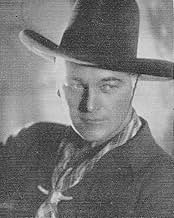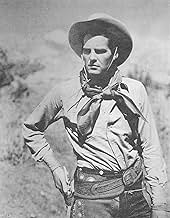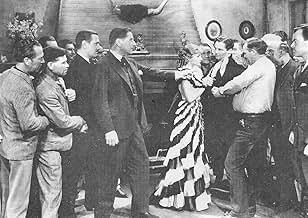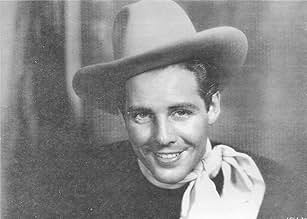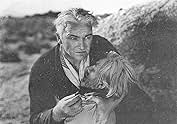AVALIAÇÃO DA IMDb
6,7/10
442
SUA AVALIAÇÃO
Adicionar um enredo no seu idiomaAn evil ranch foreman tries to provoke a range war by playing two cattlemen against each other while helping a gang to rustle the cattle.An evil ranch foreman tries to provoke a range war by playing two cattlemen against each other while helping a gang to rustle the cattle.An evil ranch foreman tries to provoke a range war by playing two cattlemen against each other while helping a gang to rustle the cattle.
- Direção
- Roteiristas
- Artistas
James Ellison
- Johnny Nelson
- (as Jimmy Ellison)
George 'Gabby' Hayes
- Uncle Ben
- (as George Hayes)
Sid Jordan
- Wrangler
- (não creditado)
John Merton
- Party Guest with a Pint in His Hip Pocket
- (não creditado)
Pascale Perry
- Outlaw Guard
- (não creditado)
Joe Phillips
- Party Guest
- (não creditado)
Monte Rawlins
- Cowhand Party Guest
- (não creditado)
- Direção
- Roteiristas
- Elenco e equipe completos
- Produção, bilheteria e muito mais no IMDbPro
Avaliações em destaque
"Hop-a-Long Cassidy" is the first appearance of this western hero. In all, William Boyd made 66 of these films and they tended to be among the better B-series films of the era.
When the story begins, there's some tension between two ranchers...to the point that you know sooner or later violence is going to break out and someone's going to get killed. Into this mess arrives Hopalong who has been summoned by one of the ranchers to help deal with this situation. What no one realizes is that one of the foremen is deliberately stoking fires on both sides...and while the ranches are fighting each other, the foreman and his henchmen are rustling their cattle! Fortunately, Hoppy is NOT a guy to jump headfirst into the problem and his slow, cautious approach is bound to bring answers.
This film is quite different from films from the likes of Gene Autry and Roy Rogers. This is no singing cowboy picture and it also is a good bit more violent than most of them as well...with a hanging, plenty of shootings and more! It all makes for a very exciting and more realistic sort of B-western. And, like a B, it runs at about one hour and is relatively low-budgeted...though it does sport an amazingly good cast for such an effort.
When the story begins, there's some tension between two ranchers...to the point that you know sooner or later violence is going to break out and someone's going to get killed. Into this mess arrives Hopalong who has been summoned by one of the ranchers to help deal with this situation. What no one realizes is that one of the foremen is deliberately stoking fires on both sides...and while the ranches are fighting each other, the foreman and his henchmen are rustling their cattle! Fortunately, Hoppy is NOT a guy to jump headfirst into the problem and his slow, cautious approach is bound to bring answers.
This film is quite different from films from the likes of Gene Autry and Roy Rogers. This is no singing cowboy picture and it also is a good bit more violent than most of them as well...with a hanging, plenty of shootings and more! It all makes for a very exciting and more realistic sort of B-western. And, like a B, it runs at about one hour and is relatively low-budgeted...though it does sport an amazingly good cast for such an effort.
Hoppy returns home only to get caught up in a rustlers' sceme that involves his friends Johnny (Ellison) and Uncle Ben (Hayes) and even Buck (Ming The Merciless!).
Aces all around, from great rocky locations, to better than usual acting, to a really surprising twist. From all this I can see why the Hoppy series became so popular following this first entry. Also, note that handsome youngster Ellison gets almost as much screentime as Boyd, maybe to entice younger viewers.
Then too, looks like the producers were intent on a big send-off since there's no stinting on the hard-riding gangs, cattle herds, or sustained outdoor locations.
Moreover, catch the imaginative camera set-ups that make good use of the rocky spire and action sequencess. The plot may be a bit worn, but happily it's imaginatively mounted. Also, catch the standing tree trunk that suddenly becomes a bed, along with cutie Mary's (Stone) jazzy dress that makes her stand out at the dance. All good touches.
Anyway, there's likely no better actor among matinee heroes than Hoppy's Bill Boyd as this flick abundantly shows. Ordinarily, I don't rate matinee westerns, but among them I'd give this one a "10". So, for front-row matinee fans like myself, don't miss it.
Aces all around, from great rocky locations, to better than usual acting, to a really surprising twist. From all this I can see why the Hoppy series became so popular following this first entry. Also, note that handsome youngster Ellison gets almost as much screentime as Boyd, maybe to entice younger viewers.
Then too, looks like the producers were intent on a big send-off since there's no stinting on the hard-riding gangs, cattle herds, or sustained outdoor locations.
Moreover, catch the imaginative camera set-ups that make good use of the rocky spire and action sequencess. The plot may be a bit worn, but happily it's imaginatively mounted. Also, catch the standing tree trunk that suddenly becomes a bed, along with cutie Mary's (Stone) jazzy dress that makes her stand out at the dance. All good touches.
Anyway, there's likely no better actor among matinee heroes than Hoppy's Bill Boyd as this flick abundantly shows. Ordinarily, I don't rate matinee westerns, but among them I'd give this one a "10". So, for front-row matinee fans like myself, don't miss it.
I thought the movie had the "feel" of western life..the cattle grazing in the opener..the dust on the outfits (except Johnny's!)You could even see the dust flying in several scenes....good characters, except the foreman (just didn't fit)..Ellison excellent as Johnny..and Hayes, McGlynn as Red and Middleton as Buck--all good...how about the scene where Hoppy appears riding Topper (I guess it was Topper,then) down that steep hill? I like the silent film "leftovers", like Hoppy's steely glare and the gathering of the ranchers scene near the end...Just a very well-done, enjoyable film! This movie borrows plot elements from the book Hopalong Cassidy (1910)-- Meeker, the H2 spread, Thunder Mesa..to name a few. I'm still reading the book, so I don't know all the details..! Interesting note-- the two well-known western character actors--Boyd and Hayes-- are from Eastern locales: Marion, Ohio and Wellsville, NY, respectively. Once again--a top rating for this film! John Field
A range war is brewing between the Bar 20 and Meeker ranches, which is being caused by Meeker's foreman Anthony (who is in reality, an outlaw called the Pecos Kid), whose method is to have each ranch be accused at acts of rustling cattle or murder, then the two ranches will start a war against each other. In the meanwhile, Anthony's gang will round up all the cattle from the two ranches, change brands, and sell them at market. It's up to Hoppy, Red, Uncle Ben, and Johnny Nelson (who is a target for Meeker's hands since Johnny is sweet on Meeker's daughter Mary) to clear the Bar 20's name and round up the outlaws. The film is a very good entry in the opening film of the Hopalong series, but far from the best, since the action doesn't really begin past the halfway point of the film. Then on it's gets better building up to a great climax. Good performances by the cast (especially by Hayes as Uncle Ben, in a pre Windy Halliday role), but Thomson is miscast and ineffective as Anthony. Rating, based on B westerns, 6.
I thought this —the first Hoppy movie— was excellent and entertaining. It could have had more action and a better mystery-detective-like plot, but so what? It was rich in character exposition, plus the fine acting, scenery, etc. James Ellison was the best young Hoppy sidekick in my opinion. I also enjoyed the acting and dialog from Uncle Ben (Gabby Hayes), Buck Peters and Red Connors characters. I was touched by the qualities expressed by the whole Bar 20 family: honor, loyalty, friendship, love, respect, competence, etc. Best,of course, is William Boyd's acting/persona. There is no need to repeat plot here as it is done in other user reviews. Key memorable scenes were (1) Hoppy's first introduction to Johnny Nelson, who had only heard heroic tales about Hoppy and had resented them; and (2) Uncle Ben's almost mystical communication with Hoppy to relay clues about the rustlers.
Você sabia?
- CuriosidadesWilliam Boyd was originally offered the role of Buck Peters, the Bar 20 ranch foreman, but chose the role of Cassidy.
- ConexõesEdited into Border Justice (1951)
- Trilhas sonorasFollowin' the Stars
Music and lyrics by Sam H. Stept and Dave Franklin
Sung by James Ellison and Frank McGlynn Jr.
Played as background music often
Principais escolhas
Faça login para avaliar e ver a lista de recomendações personalizadas
Detalhes
- Data de lançamento
- País de origem
- Idioma
- Também conhecido como
- Hop-a-Long Cassidy
- Locações de filme
- Empresa de produção
- Consulte mais créditos da empresa na IMDbPro
Bilheteria
- Orçamento
- US$ 85.000 (estimativa)
- Tempo de duração
- 1 h(60 min)
- Cor
- Proporção
- 1.37 : 1
Contribua para esta página
Sugerir uma alteração ou adicionar conteúdo ausente


